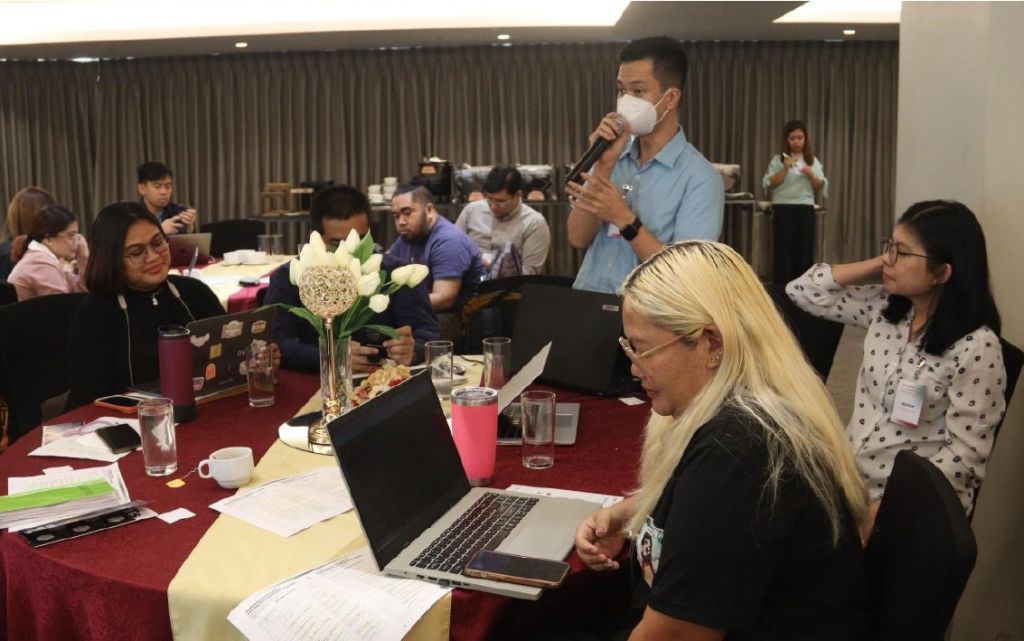In a transformative move aimed at reshaping healthcare in the Philippines, the University of the Philippines Manila Standards and Interoperability Lab (UPM SILab) hosted the Interoperability Demo & Convergence Workshop from December 11-12, 2023 at the Sequoia Hotel Manila Bay, Parañaque City. The event featured discussions, innovations, and collaborations of key stakeholders, including the Department of Health (DOH), the Philippine Health Insurance Corporation (PhilHealth), and Electronic Medical Record providers, with the aim of pioneering a new era in health informatics.
Day One
In his opening remarks, UPM SILab Lab Manager Dr. Miguel O. Aljibe set the tone for the workshop, promising enlightening presentations on innovative interoperability solutions for the health sector. He underscored UPM SILab’s mission to make data portable while upholding privacy, following the WHO SMART guidelines for training and testing interoperability.
During the first day of the workshop, Mr. Ray Justin Ventura, Chief Health Program Officer at the DOH, presented their Policy Roadmap for Interoperability during Day 1, highlighting challenges and successes amid the COVID-19 pandemic. Aligned with the Department’s 8-point agenda, the enterprise architecture aims for good health, safe services, and swift healthcare through technology.
Day One also featured insights from Jan Michael Herber, UPM SILab Terminology Specialist, who discussed the application of the Standards-based, Machine-readable, Adaptive, Requirements-based, and Testable (SMART) Guidelines of the World Health Organization (WHO) and addressing the chronic hepatitis B project. Mr. Gerard Paolo Villanueva, UPM SILab Interoperability Analyst, introduced the application of WHO SMART guidelines to the priority disease data of the Department of Health, emphasizing data connectivity and uploads for various health datasets.
Dr. Eva Maria Cutiongco-Dela Paz, Executive Director of the UPM National Institutes of Health (NIH), discussed collaborative efforts parallel to the WHO SMART Guidelines and commended ongoing efforts by Dr. Alvin D. Marcelo and UPM SILab to expand its reach in digital health infrastructure by working closely with the DOH, thereby emphasizing the importance of collective effort involving all stakeholders.
The first day of the workshop concluded with an orientation of Connectathon Mechanics, led by Christian Paul Tupas, UPM SILab Software Engineer. Participants actively engaged in coding and testing the interoperability of their Electronic Medical Records (EMRs), addressing challenges related to data structure definitions and ensuring compliance with the Fire server.

Day Two
For Day Two, Dr. Jim Steel, principal software engineer of CSIRO Australian E-Health Research Center, delivered lectures on Terminology Services and Ontoserver CSIRO. Thereafter, Dr. Alvin D. Marcelo, UPM SILab Director, led a discussion on lessons learned from various projects and presented the Connectathon Planning and Roadmapping for 2024. He emphasized the Proposed PH Base Profile and Prioritization of ValueSets in the Philippines. Ms. Emily Razal, Officer In Charge of the Systems and Software Engineering Division of the DOH introduced to the participants the National Health Data Repository, which was followed by a demonstration illustrating a patient’s journey utilizing UPM SILab’s EMR system.
The subsequent discussion highlighted key points, including the inclusion of PhilHealth to improve patient care activities and the establishment of a dashboard for monitoring various activities. Participants anticipate collaboration opportunities and guidelines to ensure inclusivity, emphasizing progress, learning, and a unified direction for quality healthcare provision. The overarching plan encompasses infrastructure development through collaboration with PhilHealth, local government units (LGUs), and technology partners, adopting a phased approach to Connectathon activities with a focus on financial sustainability and virtual engagement.
In her closing remarks, Dr. Gloria Mae Velasco, OIC-Director IV of the Knowledge Management and Information Technology Service of the DOH, highlighted the DOH’s commitment to crafting the Digital Health Strategic Framework 2024-2028 and the Health Sector Enterprise Architecture 2023-2035, underscoring the importance of partnerships, collaboration, and interoperability. Dr. Velasco urged the participants to expand networks, collaborate with each other being competitors, and remain steadfast in their commitment to innovation and interoperability, paving the way for a healthier Philippines.
Charmaine A. Lingdas